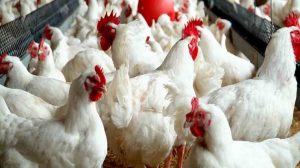Poultry farming has for long been part of the agricultural processes in several regions all over the world and it has greatly contributed to the economy of many African countries because of the high demand for poultry meat and egg and as a result, agriculture has become essential for socioeconomic expansion.
It is important to note that agriculture accounts for 30% and 60% on average of each African nation’s GDP, as well as roughly 40% of their exports. In addition, smallholder farming accounts for more than 60% of all agricultural activities in Africa. However, due to the continent’s continued struggles with famine and malnutrition, its entire agricultural potential remains unrealized. If African countries could fully utilize the potential of agriculture, studies suggest that the continent’s agricultural potential would be up to three times more productive than it is now.

Poultry Farming In Africa
Most poultry farmers in Nigeria specialize in raising chickens and turkeys, with chicken being among the most produced. Eight out of twenty Nigerians, or about 25% of the population( about 86 million people) engage in poultry production in Nigeria largely on a small scale basis. There is scarcely any region of the nation where you would not observe chickens and turkeys running around or being raised.
There are over 16.2 billion chickens in the world, and of those, 72 percent are reared in developing nations. The most common breed of fowl raised worldwide is the chicken. About 59 percent of poultry in sub-Saharan Africa is produced in rural areas, with native birds making up 70% of the overall chicken population.
Over 75% of homes raise native chickens in East Africa, where more than 80% of the population lives in rural regions. Poultry is a cheap, high-quality source of protein that is essential for lowering malnutrition in rural areas. In developing nations, poultry production has the ability to stimulate economic growth.
Africans depend on chicken and eggs as their primary sources of animal protein, which has resulted in a growth in the continent’s poultry industry. Despite the rise in the poultry business, production of chicken has stayed low when compared to other parts of the world. Notably, just 4% of the world’s chicken and poultry products are produced in Africa. To increase chicken production in Africa and keep up with rising consumption rates, this is necessary. This is because poultry is constantly imported into Africa.
Numerous African nations have imposed import prohibitions on poultry goods to safeguard domestic farmers because they recognise the significant economic potential of the local and international poultry market . However, most of these restrictions have proven to be ineffective. In nations like Nigeria, Ghana and Uganda, the smuggling of chicken products particularly meat has grown significantly.
Food security throughout Africa is greatly influenced by poultry farming, Africa has a relatively high per capita consumption of chicken products, and the industry maintains a consistent supply of these goods, decreasing the need for imports and regulating local market prices. As a result, food shortages are lessened and the population’s general nutritional state is improved.
The Benefits of Poultry Farming to Africa So Far
In Africa, the poultry industry helps to generate revenue. Because of their high market value, poultry products are a lucrative business for farmers. Profits from the selling of chicken meat, poultry eggs feathers, and other consumables can be invested again in business expansion or used for any other type of business or economic activity. The activities of the poultry industry also boosts economic activity in other related fields like feed manufacturing, veterinary care, equipment manufacture, and transportation and tertiary production. This has a multiple impact in accelerating the continent’s overall economic growth and development.
Africa’s poultry industry has a considerable export potential. The quality and affordable prices of the continent’s poultry products have made them highly sought-after internationally. African nations may access global markets by developing and expanding their poultry industries, which will help them earn foreign currency and improve their trade balance. To fully realize this potential, African nations must, however, invest in processing facilities, fulfill global quality and safety standards, and build robust sales and distribution networks.
Despite the substantial economic contributions that poultry farming makes to Africa, there are still issues that must be resolved if the continent is to continue to prosper. Disease outbreaks like avian influenza pose a serious threat to the industry and can decimate flock sizes. To reduce these risks, governments must fund disease surveillance, prevention, and control programmes. In order for small-scale agricultural producers to invest in cutting-edge production methods and infrastructure, there is also a need for increased access to financing and credit facilities.
To improve poultry production in Africa and the nutritional status of Africans, a number of obstacles must be overcome. To support the poultry industry’s future growth across the African continent, for instance, the chicken’s immunity, health, and productivity should be improved. In order to increase the economic viability of the poultry sector, it is also important to effectively handle consumer confidence, product quality and safety, product types, and immunisations and medications for chicken diseases.